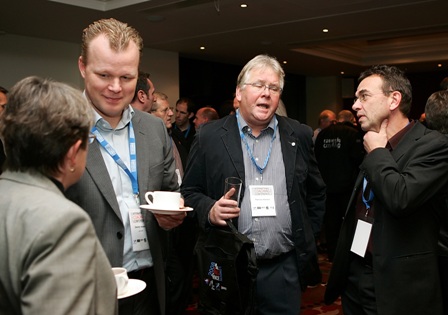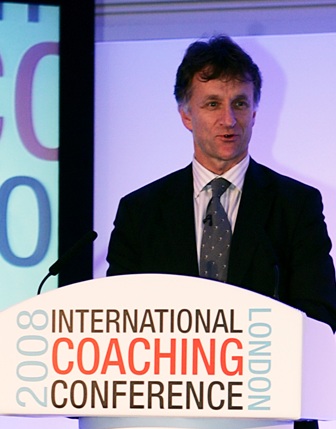
Talking coaching at the ICC
Top coaches, top conference
In December’s TLR we promised an in-depth review of the International Coaching Conference held at Twickenham. Anne Pankhurst, the new technical editor of Coaching Edge magazine, kindly agreed to give us her personal perspective.

Talking coaching at the ICC
Twickenham Stadium played host to a very different sporting event in mid-November – and this one was not on the pitch! It was the International Coaching Conference, arranged by sportscoach UK and the Rugby Football Union and held from 18 -20 November. The theme of the important event was ‘Expert Coaches, Expert systems – benchmarking best practice’ and nearly three hundred coaches, coach educators and experts in different fields of coaching attended from many different sports and many different nations. The delegate mix gave the conference an international atmosphere but, perhaps more importantly, a great sense of purpose and of coaches and coach educators working together. The setting in the conference suite in the new south stand was excellent and the conference was organised superbly by Sportscoach UK’s in-house team, allowing those attending ample opportunities to listen, learn, contribute and question highly qualified speakers and their fellow delegates.
It is important to put such an event in the national, European and global context. This conference had a real purpose for the future, built on a solid background. Nationally, as we approach the London Olympics, the quality of UK coaches will come under the spotlight – our athletes need and deserve expert coaches. There is a recognition that coaches impact strongly on the lives of all sportspersons, whatever their age or ability. The needs for coaches to ‘know their trade’, not just in the technical, tactical, mental and physical components but in their moral and ethical behaviours, is paramount. Sportscoach UK has well-developed strategies and systems to train and develop expert coaches in all the domains of coaching and in all components of their work. This conference was an opportunity for both expert coaches and experts in coaching systems to meet, present and discuss their ideas together. From the European perspective, the EC has placed sport in a more central position and so the work of coaches and coaching will become more important and attract attention. Expertise in both will be expected as the norm. In the global context, the UK was a signatory to the Rio Maior Convention on the Recognition of Coaching Competence and Qualifications so there is a need to ensure that coaching systems both in developed and developing nations meet the highest standards of delivery and expertise in coach education.
The conference format was a successful one with a mixture of plenary sessions, keynote presentations and small topic-specific workshops and working groups. Such a format can be difficult to make work, but this conference did just that! Delegates seemed both challenged and ready to take ideas on board, as well as appreciating the opportunity to question and debate in workshops that were of particular interest to them.
The main conference business was preceded by a closed day-session that brought together coach educators and coaches from all over the world; from different groups, such as the Australian Sports Commission, the USOC and the Portuguese Coaches Association, as well as specific sports organisations, such as the IAAF, the ITF and the PGA, and individual sports federations, such as tennis and cycling. The intention was to identify the key factors of expert coaching and expert coaching systems. The International Council for Coach Education’s president, John Bales, and chairman of the European Coaching Council, Pat Duffy, opened the presentations. Then the delegates split into smaller groups for short presentations and long discussions before meeting together as the whole group to ‘pull together’ lessons learned and ideas delivered.
The ICC Opening Session began with 254 delegates, meeting in a plenary session for introductory presentations from key people in national, European and global coaching; John Bales, Heather Crouch from Sportscoach UK, Karen Petry from the European Network of Sports Science Education and Employment, and Francis Bacon from the RFU. The conference theme of expertise in coaching and coaching systems was then brought to the forefront by the next three presenters. The delegates listened first to Baroness Sue Campbell CBE, then Sir Clive Woodward OBE and then Peter Keen, all giving their thoughts and ideas on the meaning and impact of expertise in coaching, coaching education and sport. For me this session was one highlight of the conference because it clarified the issue of excellence and how it could be achieved. Baroness Campbell left the audience with a number of thoughts. Among many other ideas she described the stages that lead to excellence: personal ambition is the only limit (you are only constrained by your own imagination as you search out solutions); challenge yourself and support others (the journey should be a shared one); and if you think you have reached the top, you will fall off the mountain (excellence is about continual improvement).
Peter Keen had a similar theme, speaking about the pursuit of excellence being leaps of faith, together with the need for constant adaptation. Clive Woodward spoke about what the expert coach looks like. These three speakers set the tone and intention for the remainder of the conference.
The next two days were a mix of plenary and workshop sessions with the first plenary session on the second day having seven different presenters analysing how coaches develop their expertise. Then the delegates were free to follow workshops of their choice, either to discuss coaches or coaching systems and key issues for the development of both. One of the highlights of the day was listening to Bill Furniss talking about coaching Rebecca Adlington. Mentioning her work rate, he also said that he has never had to tell her anything twice. I was left wondering about the many young athletes with whom I have worked. I realised that this is an attribute of many of them and is therefore perhaps a marker of excellence.
The plenary session which began the final day was chaired by Jill Douglas from the BBC and examined different international perspectives of coaching, including the ability of coaching practice to move across national boundaries. The conference again then split into the two strands of expert coaches and the development of expert coaching systems for the future. Delegates were again free to choose their interest. Many coaches chose to attend workshops on coaching systems, while some coach educators attended the presentation by Pierre Trudel and John Lyle on the analysis of coaching excellence. The final session of the conference was again chaired by Jill Douglas, who spoke with Trevor Brooking and Rob Andrew about the two themes of the whole conference – expert coaches and expert coaching systems.
An important aspect of any good conference is to give delegates the opportunity to ‘network’ and the ICC conference matched up to this need . There was a drinks reception and two conference dinners, but coffee and lunch sessions also gave plenty of time for people to meet and exchange ideas and information. That said, high-quality catering is one thing, but the service from the catering staff was outstanding. Nothing was too much trouble for any one of them, even to go everywhere and anywhere for decaf tea!
Sportscoach UK, is to be congratulated on putting together a superb and worthwhile conference that firstly did justice to the theme and secondly gave each delegate much to think about from both the coach and coaching systems viewpoint. Again the staff were outstanding, pre-empting whatever was needed. One was left with the feeling that the ability of the UK and other nations to deliver expert coaching systems that help deliver expert coaches for all, whether that is world-class athletes, children or those who just love to take part in sport, is on track and ready to move forwards.
Anne Pankhurst is technical editor of Sportcoach UK’s Coaching Edge magazine. She is is also a highly respected coach and coach educator.
The Leisure Review, February 2009
© Copyright of all material on this site is retained by The Leisure Review or the individual contributors where stated. Contact The Leisure Review for details.
